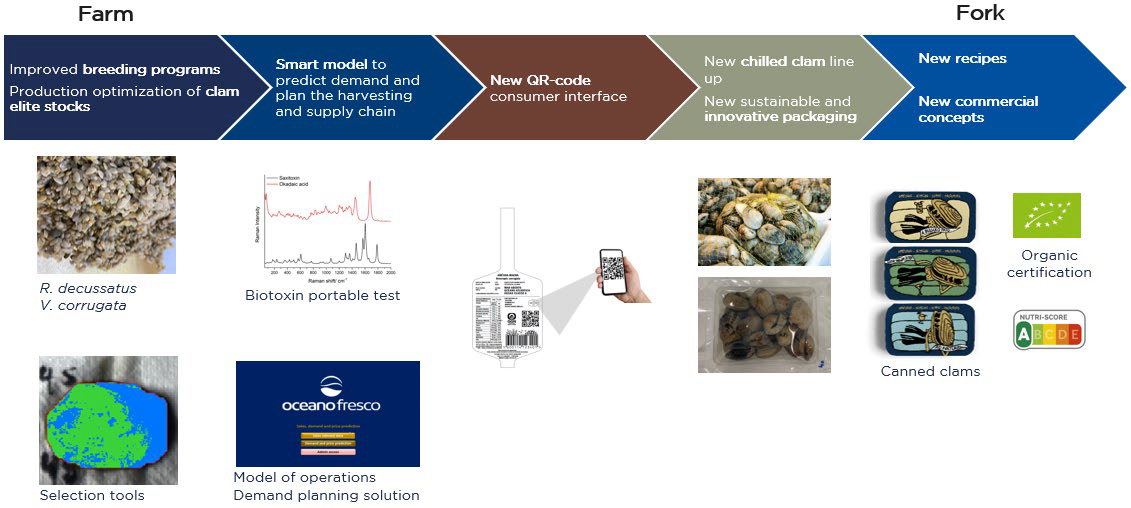More information
Description
As the world population grows, demand for food increases just as much, both in quality and in quantity. Within this context, bivalves which filter-feed on phytoplankton, are the most sustainable source of animal protein. However, few gaps along the value-chain exists that needs to be overcome to increase the shellfish industry standards and to support the production, packaging, and supply of European autochthonous species such as Ruditapes decussatus and Venerupis corrugata.
The ATLANTICLAM project aims to bring Euro-native clam species from “farm to fork”, in an integrated, differentiated and consumer-oriented way. The project intends to solve the main obstacles to a wide dissemination and consumption of Euro-native clam species: availability all-year round – addressed by R&D activities in ATI 1; difficulty to match production with market demand – addressed by R&D activities in ATI 2; lack of trust on the source/origin of the clams - addressed by R&D activities in ATI 3; lack of trust on the quality and freshness of the clams - addressed by R&D activities in ATI 4; lack of solutions to increase the in-home consumption of clams - addressed by R&D activities in ATI 5.
Thus, the project will achieve the development of: 1) an improved breeding program and production optimization of clam elite stocks; 2) a smart model to predict demand and plan the harvesting and supply chain of European clams; 3) a new QR-code consumer interface, with data about all the product chain and source; 4) new chilled clam line up and new sustainable and innovative packaging; 5) new recipes and commercial concepts.
With a consortium between Oceano Fresco, Nofima, Maritech, INL and ESB-UCP, ATLANTICLAM will strengthen both bilateral relations and international cooperation between Portugal and Norway, sharing know-how and disseminating knowledge across borders.
Summary of project results
As the world population grows, demand for food increases just as much, both in quality and in quantity. As the aquaculture sector represents the only way to sustainably support increased consumption of aquatic food, it will have to undergo major investments in terms of technological innovation, to ensure its sustainability and to maintain high standards of safety and quality for the final consumer.
Within this context, bivalves are the most sustainable source of animal protein, being their production typically characterized by low cost, low income, and low technological level.
However, it is needed to overcome some gaps along the value-chain to increase the shellfish industry standards and to leverage the production, packaging, and supply of Euro-native clam species.
This way, the ATLANTICLAM project aimed to develop and implement an innovative approach to the production and commercialization of bivalve varieties, specifically the Euro-native clam species Ruditapes decussatus and Venerupis corrugata.
It included R&D activities to introduce innovations along the value chain (from farm to fork) to contribute to creating an all-year-round reliable consumption of sustainable, healthy and tasty European clams, such as:
• Improvement of breeding operations, with the design of breeding programs and the development of genomic
tools to increase their accuracy;
• Development of a new portable biotoxins test to predict HAB’s at the open sea farm;
• Development of demand planning digital solutions and a product traceability tool;
• Development of new products to extend shelf life and evaluation of sustainable and innovative packaging.
During the project development, a new relevant challenge arose with the presence of polychaetes on clams produced
at the open sea farm. Thus, although, not initially planned, some tasks were additionally carried out: (i) assessment of
polychaetes’s prevalence and severity; (ii) identification of promising methods to eradicate polychaetes without
compromising clams’ well-being; (iii) optimization of a spectrometric technique to determine relevant clams’ traits
without having to sacrifice them, including internal and external polychaetes.
The following figure summarizes the main results achieved during the ATLANTICLAM project:
This project allowed to make significant improvements along the value chain, which will have a cumulative impact on the production and marketing of clams in long-term. The implementation of new formats besides fresh clams, such as chilled and ready to eat products, will make it possible to reach new geographies and markets. In addition, new commercial concepts and strategies of communication with the consumer will result in the valorisation of the product and, consequently, in an increase in demand.
Summary of bilateral results
Nofima from Norway, the donor project partner, was of utterly importance in the implementation of the project intwo relevant stages of the value chain: (i) optimization of production of clam elite stocks; (ii) development of newproducts and innovative packaging solutions.Concerning the breeding operations, there was close collaboration with Nofima throughout the project, not only inthe definition of breeding plans, but also in the development of founder populations for both clams’ species and ofgenomic tools to improve the selection capabilities. In addition, Nofima shared their expertise and technology ontasks that had not been foreseen. Knowing the arose difficulties with the polychaete infestation at the open sea farm,and having a spectral solution set up for fish, it was carried out a joint study on the application of this technology toclams. Both works will result in an optimised production and in ISI publications that will be available to the scientificcommunity.Beyond this, Nofima has experts in the field of food processing and development of new products, including withother species of bivalves. In this project, this expertise and technologies were applied to the native European species.This knowledge transfer and collaboration resulted in the creation of new products, which allowed diversify thecompany’s portfolio and reach new markets, and in publications that will be available to the scientific community.The project allowed to solidify the relationship between all Portuguese partners and Nofima at Norway. The bilateralcollaboration will be extended beyond the project in both topics addressed
